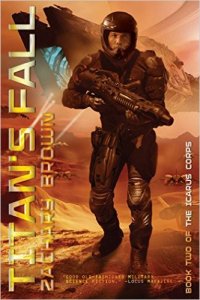Russell Letson reviews Zachary Brown
Titan’s Fall, Zachary Brown (Saga 978-1-4814-3038-8, $14.99, 204pp, tp) March 2016.
 I keep insisting that the usual run of military-SF adventures has a limited appeal for me – a description of the limits of my tastes and interests rather than a judgment on the value of the whole subgenre or even of particular books I might set aside after a chapter or two. And I’m vain enough to believe that when a military-themed book hooks me, it’s because it really does possess some special quality. That has been the case with a number of titles over the last couple years, including The Darkside War (reviewed in July 2015), the first-in-a-series book by the pseudonymous ‘‘Zachary Brown.’’ As with recent work by Greg Bear, Ann Leckie, and Linda Nagata, Brown’s picture of future soldiering and the context in which it operates leavens traditional respect for the fighting man and woman with a recognition of the ambiguities, ironies, failures, and outright criminalities of warfare.
I keep insisting that the usual run of military-SF adventures has a limited appeal for me – a description of the limits of my tastes and interests rather than a judgment on the value of the whole subgenre or even of particular books I might set aside after a chapter or two. And I’m vain enough to believe that when a military-themed book hooks me, it’s because it really does possess some special quality. That has been the case with a number of titles over the last couple years, including The Darkside War (reviewed in July 2015), the first-in-a-series book by the pseudonymous ‘‘Zachary Brown.’’ As with recent work by Greg Bear, Ann Leckie, and Linda Nagata, Brown’s picture of future soldiering and the context in which it operates leavens traditional respect for the fighting man and woman with a recognition of the ambiguities, ironies, failures, and outright criminalities of warfare.
This becomes the central non-combat feature of Brown’s second book, Titan’s Fall, which follows the career of Devlin Hart, a reluctant soldier in a war visited on our solar system by contending alien powers. The Accordance arrived on Earth bearing gifts, along with a big-stick attitude toward any locals who were disinclined to join their war against the really, really nasty Conglomeration forces heading our way. After the Conglomeration attack that gave the first book its title, Hart and his two surviving squadmates – Accordance-loyalist Ken Awojobi and street-smart hacker Amira Singh – have become celebrities of a kind. Now they are stationed on Titan, heavily fortified by the Accordance but under Conglomeration threat, and they find themselves facing internal as well as external menaces. On the conventional-combat side, ‘‘conventional’’ means facing alien tech with big knobs on: self-configuring swarms of robotic ‘‘crickets’’; big, armored reptilian-cyborg ‘‘raptors’’; ‘‘drivers’’ that turn an Accordance trooper into a ‘‘brain-dead meat-puppet’’; bipedal, rhino-like ‘‘trolls’’ that can ‘‘stamp you into a puddle.’’
Accordance personnel aren’t much more appealing – the officer corps consists mainly of the arrogant, clannish, octopus-ish Arvani, who see humans as cannon-fodder. The ostrich-looking ‘‘struthiform’’ doctors are decent enough, though, and the platoon’s medic is a sympathetic, chorus-like character. Shriek (his real name is unpronounceable) is physically damaged and psychologically traumatized (his planet has been destroyed by the Conglomeration) but dedicated, though he refuses to learn the names of the soldiers he treats, because it would make losing them even more painful. The most interesting aliens by far are Accordance allies who can and do refuse to be either clients or subordinates: the Pcholem, space-born living starships who volunteer to oppose the Conglomeration, who never forget an admirable deed, and who thus remember Devlin for his actions in the Darkside battle.
The novel’s title telegraphs the arc of the story, so it’s no spoiler to reveal that in addition to the expected scenes of combat on Titan’s exotic surface and in the tunnels of Accordance installations, loyalties are betrayed, coats are turned, mutinies raised and quelled, and lines – of battle and internal alliance – are drawn and redrawn.
It’s interesting to watch Brown and Greg Bear (War Dogs and Killing Titan, reviewed in November 2014 and 2015 respectively) work with parallel situations and components, and it’s hard not to see both series as responses to our real post-WW2 history, with great powers drafting third-party nations or colonies into their conflicts and waging proxy wars that have little or nothing to do with the interests of many of the combatants – beyond the unpalatable choice of deciding which meatgrinder will chew up one’s homeland. Both series see interstellar, interspecies warfare from the viewpoint of the dragooned colonial, the volunteer-at-gunpoint. Great powers and hierarchies contend, whole planets and civilizations are at risk, but value abides in the squad, in the grunts who have your back, and in the competence and courage of soldiers who know your name and trust your judgment.





